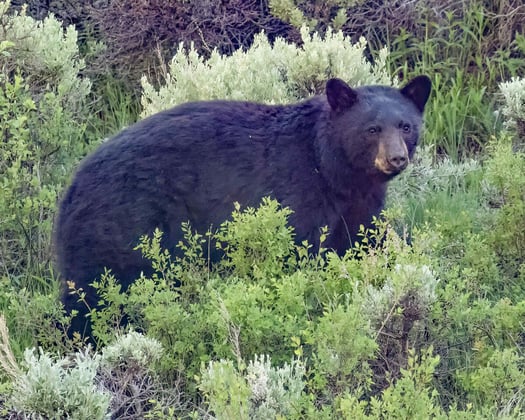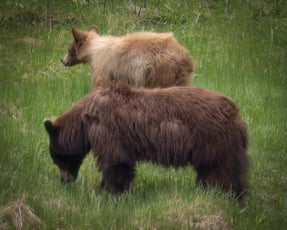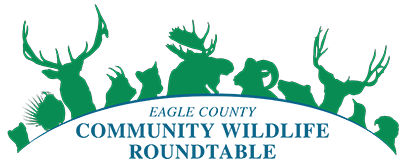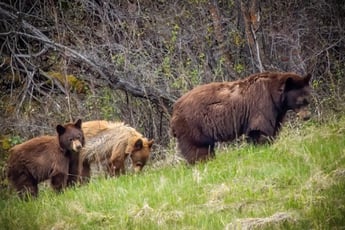Be an Eagle County NeighBEARhood Ambassador!

Rick Spitzer

If you live in Eagle County, you’ve made your home in black-bear habitat. Black bears (Ursus americanus) have lived in Eagle County and our adjacent Wilderness Areas since long before the first pioneers arrived. Today, these beautiful and complex creatures share their habitat with an ever-encroaching human population. This time of year, it’s especially important to take extra common-sense precautions to protect our ursine neighbors. In 2023 alone, wildlife officers had to euthanize 63 black bears in Colorado and relocate another 33. Sadly, over 90% of these were due to human-made causes.
 Don't mess with or approach a Black Bear! Black Bears may weigh 130 – 660 lbs for males and 90 – 180 lbs for Females. They can run 25 to 30 miles per hour. Fastest human speed in the Olympics? 27.33 mph.
Don't mess with or approach a Black Bear! Black Bears may weigh 130 – 660 lbs for males and 90 – 180 lbs for Females. They can run 25 to 30 miles per hour. Fastest human speed in the Olympics? 27.33 mph.
According to Colorado Parks and Wildlife, “Most conflicts between people and bears can be traced to human food, garbage, pet food, bird seed, or other attractants. When people allow bears to find food, a bear’s natural drive to eat can overcome its wariness of humans. Bears that get too comfortable around people can destroy property or even become a threat to human safety. Habituated bears must often be killed.”
As natural food sources dwindle, black bears begin to enter their dens and start “torpor,” a state resembling hibernation but during which they may occasionally waken. Between now and then, black bears have one main job – eating enough to survive four months of hibernation. During this stage, called “hyperphagia,” a bear’s daily consumption jumps from an average of 5,000 calories a day to 20,000 – the rough equivalent of 30 bacon cheeseburgers per day!
Most conflicts between people and bears can be traced to human food, garbage, pet food, bird seed, or other attractants. Black Bears have great memories and once they find a food source, they’ll return. Your home could be next! (Photo by Allan Finney)
Right now, black bears need to gain 2-4 pounds a day. Since over 90% of a bear’s natural diet consists of grasses, fruits, nuts, and plants, with the rest primarily insects, scavenged carcasses, and small animals, bears must eat up to 22 hours daily to meet their caloric needs.
Human food sources tend to be more calorie dense, and consequently highly attractive to bears. And bears have an incredible sense of smell – they can pick up scents from well over a mile away, with some estimates of even 20 miles! In fact, bears have the best sense of smell of any North American land mammal, about seven times better than a bloodhound’s and over 2,000 times better than ours.
Curious, intelligent, and resourceful, black bears also have great memories. Once they find a food source, they’ll return. If that source is near or in human homes, cars, or campgrounds, negative human-bear conflict results. How can we help with the bear necessities of life?
Join us as a NeighBEARhood Ambassador and pledge your commitment to reducing human-black bear conflicts in our community. By taking this pledge, you’ll not only help to promote a safe and healthy environment for both bears and humans, but you’ll also gain access to a comprehensive toolkit full of resources to share with your network.
Black bears are omnivores. They eat grasses, fruits, nuts, plants, insects, scavenged carcasses, and small animals.
With social media content and other valuable resources at your disposal, you’ll be empowered to spread the word about the importance of reducing human-black bear conflicts in our community. So why wait? Take the pledge today and become a part of a growing movement fighting to make a real difference in our community.
Together, we can create a safer and more sustainable environment for everyone! Every time a human encounters a bear, we are endangering their lives. We love seeing these beautiful creatures, but it’s important to practice Bear Aware Enjoyment. Join us in keeping everyone safe – bears and humans – by becoming a NeighBEARhood Ambassador today!
Following a few simple rules will help ensure that we and our homes don’t endanger bears:
- Lock all ground-level doors and windows of your home and car when you are not there, and at night. ·
- Don’t leave food, trash, coolers, air fresheners, or anything with a scent in your vehicle.
- Properly dispose of food and trash properly, and encourage others to do the same at work and at home.
- Use bear-proof trash receptacles and keep them closed and latched at all times.
- Keep all outdoor dining areas clean of all food spills.
- After cooking outdoors, leave your grill on high heat for 5 minutes to remove all food residue.
- Clean up parking lots and driveways when you see trash on the ground.
- Keep your yard clear of natural food by keeping berries and the fruit of trees harvested or trimmed back.
- Pick garden vegetables as they ripen.
- Closely supervise pets at all times when outside and feed them indoors only.
- Never purposefully attract bears to your yard or home.
- Avoid leaving scented products outside.
Never approach a bear. If you see a bear close by, ensure it has a way to leave, stand tall, and talk to the bear to avoid surprising it.
When hiking or camping, leash your dog – otherwise, they may resemble an easy snack or bring a disturbed bear to you. Leashing is the law in our Eagle County Wilderness Areas, home to most of our favorite trails. Campers should store food and anything that smells in a bear-proof container away from tents.
Let’s respect bears and understand that we live in their habitat. Don’t be responsible for the death of these amazing creatures. Do your part to bear-proof yourself, your home, and property. Let’s keep bears alive and healthy, and keep wildlife WILD.
Take the NeighBEARhood Ambassador pledge Become a NeighBEARhood Ambassador (eaglecounty.us) and receive a free Ambassador Toolkit with easy ways to spread the word and encourage others to join in keeping bears and our community safe.
Become a NeighBEARhood Ambassador
The Eagle County Community Wildlife Roundtable is a collaborative partnership with the White River National Forest, Colorado Parks and Wildlife, Bureau of Land Management, local government entities, community members, and citizen scientists. The purpose of the Eagle County Community Wildlife Roundtable is to gather a group of diverse stakeholders in the valley to understand and address issues facing wildlife populations. Together we will identify a shared vision and realistic actions that the community can rally around to support wildlife. We want to leverage diverse values, creativity, and resources to move toward positive action.

Rick Spitzer
Rick Spitzer is the author of the article and official photographer for Eagle County Community Wildlife Roundtable.
Blog posts
Related Articles.


Eagle County Community Wildlife Roundtable
Spring is in the Air and so are Bears…& Trash
It’s time! Bears are coming out from their long winter naps. Typically bears hibernate from...

